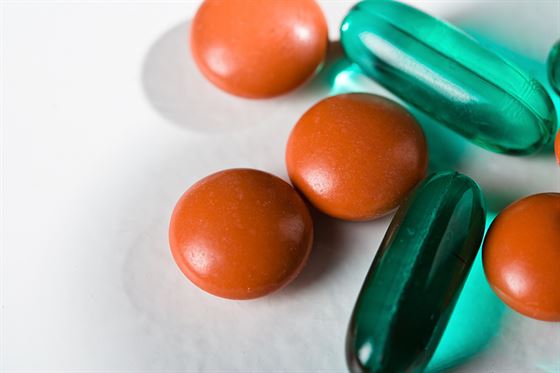We’ve all read about those miracle diets and pills to keep you healthy. But can you find fitness for golf in a capsule? We just received a great post on fitness and nutrition from Issa Bacsa, a nurse, a freelance writer and a novelist. She writes blogs for Bodylab, a trusted health and fitness website in Denmark. There is a lot of good information here. It’s a long article but worth the read. Enjoy!
. . . .
I already had a hearty breakfast — two slices of whole wheat bread, ham and egg, a fruit in season, and a glass of fruit juice. Then I took a capsule of multivitamins, herbal capsule for blood cleansing, and another for my source of calcium and magnesium. So I already took three capsules. I still have to take a Gingko biloba after lunch and Melatonin before going to bed. Why? What are these really?
 As a nurse and medical technologist, I have used these products with confidence. These are dietary supplements (also called food supplements or nutritional supplements). These are substances you eat or drink. They can be vitamins, minerals, herbs, amino acids, or parts of these substances. They can be in the form of a capsule, tablet, liquid or powder. As the name implies, they supplement or add to the diet and provide nutrients that may be missing or may not be consumed in sufficient quantities in a diet. Some countries consider them as foods, while in others they are drugs or natural health products and should not be considered a food substitute.
As a nurse and medical technologist, I have used these products with confidence. These are dietary supplements (also called food supplements or nutritional supplements). These are substances you eat or drink. They can be vitamins, minerals, herbs, amino acids, or parts of these substances. They can be in the form of a capsule, tablet, liquid or powder. As the name implies, they supplement or add to the diet and provide nutrients that may be missing or may not be consumed in sufficient quantities in a diet. Some countries consider them as foods, while in others they are drugs or natural health products and should not be considered a food substitute.
Dietary supplements are widely available in health food stores, groceries, pharmacies, by mail and online. People take them for health reasons. In fact, active ingredients in supplements have been used for thousands of years. Your grandmother may have given you a dose of herbal tea or have advised you to eat certain fruits or vegetablesas relief to specific illness. Scientists have been using the age-old herbal secrets of our ancestors to come up with new medicines or supplements.
Here are the top ten supplements that are worth using to optimize your health and reduce the risk of diseases.
1. Super green foods As the name implies, these are derived from green plants, grasses, and even algae like broccoli, wheat grass, spirulina, and chlorella. These plants contain high concentrations of chlorophyll and are harvested seasonally to take advantage of high potencies of naturally occurring phyto-nutrients. Some say the greener, the better. It is said that phyto-chemicals help reduce the risk of certain diseases like cancer. These super green foods are available in tablet or liquid form as individual ingredients or in combination.
2. Multivitamins and minerals The health benefits of supplementation with multivitamins and minerals are well studied and they are available everywhere. They are best taken with meals. Just remember to take a multivitamin with iron only if your doctor has determined that you are pregnant or have been diagnoses with iron-deficiency anemia. If iron deficiency is not present, taking an excessive iron may irritate the digestive tract.
3. Fish oil and omega-3s Fish oils are a direct source of two long-chain fatty acids known as EPA (eicosapentaenoic acid) and DHA (docosahexaenoic acid). These have anti-inflammatory properties, thin the blood, and balance the immune system.EPA is said to be effective in reducing inflammation in arthritis and autoimmune conditions.DHA is critical for the proper development and function of the brain. Not only is fish oil one of the most effective ways to stabilize heart arrhythmias, it also prevents blood clots, and lowers triglyceride and cholesterol levels.
4. Probiotics Billions or more of bacteria live in our digestive tract and comprises almost four pounds of our body weight. These bacteria are important in our body’s digestive, immune, and detoxification systems. Probiotics decrease food allergies, helps in the treatment of constipation, diarrhea, and colitis. Because of too much use of chlorinated water and stress, our normal digestive flora is depleted thus probiotics supplementation is recommended.
5. Garlic Garlic supplements are popular because it is said to prevent colds and flu and lowers blood cholesterol levels. Researchers say that the elasticity of the heart’s aorta diminishes with age. Garlic was found to help protect aorta’s elasticity. Therefore, it is recommended that people start taking garlic supplements as early as mid-twenties to prevent cholesterol plaque buildup. Just a note of caution, garlic has mild blood thinning properties so check with your physician first before using especially if you are taking blood thinning medications.
6. Coenzyme Q10 Coenzyme Q10 or CoQ10 is a nutrient naturally occurring in foods and in the human body. Body cells use CoQ10 to create energy within the cell mitochondria. Research shows that CoQ10 helps in the management and treatment of heart conditions and high blood pressure. However, statin drugs, commonly used to lower blood cholesterol deplete CoQ 10 in our body. That is why those who are taking statin drugs experience fatigue, pain, and muscle weakness. Like garlic, CoQ10 does have mild blood-thinning properties so consult your doctorfirst before using it if you are taking blood-thinning medication.
7. Ashwagandha Also called Indian ginseng, winter cherry, or withania, ashwagandha is a root of Withaniasomnifera that helps decrease the effects of stress. It has similarities with the Chinese ginseng only this is gentler and could easily be tolerated. It is traditionally used in Ayurvedic medicine for fatigue, chronic diseases, impotence, poor memory, asthma, bronchitis, psoriasis, arthritis, and infertility. It causes antioxidant activity that protects brain cells thus making it a good anti-ageing supplement, too. It also stimulates red blood cell production so ithelps in the treatment of anemia. Pregnant women are advised not to take this supplement.
8. Green tea People who consume green tea on a regular basis appear to have less incidence of cancer and have low blood cholesterol level. Caffeine in green tea found in commercially-available supplements are removed or decreased.
9. Enzyme complex Enzymes support every metabolic reaction in the body. People use enzyme supplements for various therapeutic reasons. For example, bromelain is a protein digesting enzyme that has anti-inflammatory effects when taken between meals making this effective in the treatment of sinusitis, arthritis, and other conditions involving the joints and tissues. Enzymes also improve digestion and support the nutrition of people with cancer.
10. Calcium and magnesium According to studies, one out of four women over 50 suffers from osteoporosis. But that doesn’t mean men are not prone to this disease. Research also shows that one in eight men has osteoporosis. However, a life-long supplementation with calcium and magnesium is the only way to prevent osteoporosis. Calcium and magnesium work together effectively when taken in a ratio of two parts calcium to one part magnesium. High blood calcium level helps in the prevention of colon cancer, pre-menstrual syndrome, high blood pressure and muscle spasms. Magnesium on the other hand, is important for heart function and energy production. They can be taken separately or combined. There are available formulas that also contain vitamin D as this vitamin helps in calcium absorption.
It still pays to ask your doctor for advice regarding food supplements. Since these are supplements, and like any other medicines, they may interact with the prescription medications you might be taking or may be contraindicated to your condition. Interaction may range from side effects to allergic reactions. Manufacture of dietary supplements are not required to be standardized in the US thus the effectiveness of the supplement differ among brands. Also, experts claim that the form of supplement you buy in health foods or grocery stores may not be the same form used in the laboratory research. The long-term effects of most dietary supplements mentioned here are not yet known, with the exception, of course, of vitamins and minerals.
. . . . .
Do you take food supplements? If so, how have they improved your health? your golf game? Add your comments in the space below.





